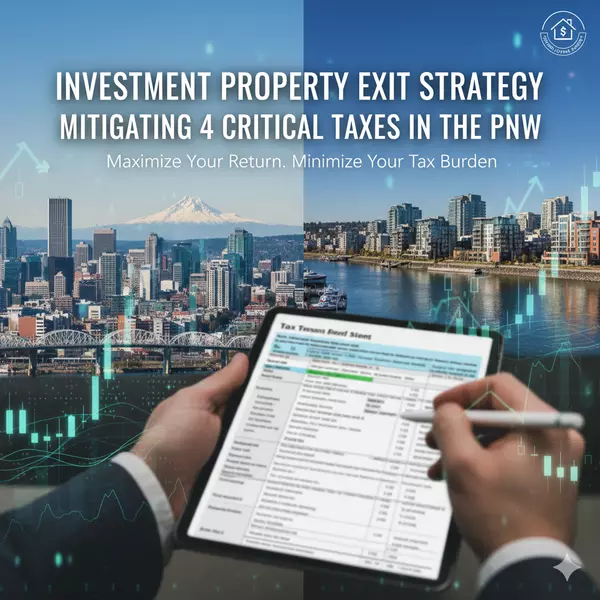6 Essential Tips for New Real Estate Investors
6 Essential Tips for New Real Estate Investors
Diving into real estate investment can be an exciting yet daunting venture. To ensure a successful start to your investment journey, it’s crucial to be well-prepared. Here are six essential tips that every new real estate investor should know:
1. Hire an Experienced Real Estate Agent 
- Expert Guidance: Working with a real estate agent who has experience in real estate investing can be invaluable. They can provide insights on market conditions, help you find profitable properties, and negotiate favorable deals.
- Network and Resources: An experienced agent has a network of contacts, including lenders, inspectors, and contractors, which can be beneficial for your investment endeavors.
2. Understand the Market and Location
- Research Local Markets: Your investment’s success heavily depends on choosing the right location. Research areas with robust economic growth, job opportunities, and population increases. These factors contribute to higher demand and property value appreciation.
- Market Trends: Stay informed about market trends and cycles. Knowing whether a market is in a boom or bust phase can significantly influence your investment decisions.
- Neighborhood Analysis: Evaluate neighborhoods carefully. Consider the quality of amenities, schools, safety, and future development plans. These aspects play a vital role in determining the desirability and value of your investment.
3. Financial Preparation and Budgeting 
- Capital Requirements: Understand the total capital needed, including down payments, closing costs, and reserves for unforeseen expenses. Proper financial planning is essential to avoid any financial strain.
- Financing Options: Explore various financing options such as traditional mortgages, private lenders, or partnerships. Each has its pros and cons, so choose the one that aligns best with your financial situation and goals.
- Cash Flow Analysis: Ensure your property will generate positive cash flow. Calculate potential rental income, expenses, and net operating income (NOI) to make informed decisions.
4. Risk Management and Diversification
- Risk Assessment: Identify potential risks like market volatility, tenant turnover, and property damage. Having a risk management plan in place is crucial for long-term success.
- Insurance: Secure comprehensive insurance coverage to protect against property damage, liability, and loss of rental income.
- Diversification: Spread your investments across different properties and markets to reduce risk. Diversification helps safeguard your portfolio against market fluctuations and maximizes returns.
5. Property Management and Maintenance
- Self-Management vs. Property Management: Decide whether to manage properties yourself or hire a professional property management company. Weigh the costs and benefits of each approach to determine the best fit for your situation.
- Maintenance and Repairs: Budget for regular maintenance and unexpected repairs. Keeping your properties in good condition is essential for maintaining their value and ensuring tenant satisfaction.
- Tenant Screening: Implement a thorough tenant screening process to minimize the risk of problematic tenants. Conduct background checks, credit checks, and verify rental history for potential tenants.
6. Legal and Tax Considerations
- Legal Compliance: Ensure compliance with local, state, and federal laws, including landlord-tenant regulations, zoning laws, and property codes. Staying compliant avoids legal complications and fines.
- Tax Benefits: Take advantage of tax benefits like depreciation, mortgage interest deductions, and 1031 exchanges. Consulting with a tax professional can help you maximize these benefits and optimize your tax strategy.
- Entity Structure: Consider the best legal structure for your investments, such as forming an LLC or corporation. This can protect your personal assets and provide favorable tax treatment.
By following these essential tips, new real estate investors can build a strong foundation for a successful investment portfolio. Stay informed, plan meticulously, and manage wisely to achieve your real estate investment goals.
Categories
- All Blogs (499)
- For Sale By Owner (15)
- Local Events (7)
- 1031 Exchange PNW (1)
- Affordability (34)
- Agent Value (90)
- Buying Tips (202)
- Clark County Housing (4)
- Closing Costs (1)
- Community Support (2)
- Debt-Free Living, (1)
- Design (8)
- Downsize (8)
- Downsizing Vancouver WA (1)
- Economy (25)
- Equity (25)
- Expired Listings (1)
- Featured (1)
- Financial Planning (33)
- First-Time Home Buyer (149)
- For Investors (1)
- For Sale by Owner (4)
- Forecasts (16)
- Foreclosures (4)
- Foster Care Resrources (1)
- Fun Tips (5)
- Giving Back (1)
- Home Buying (255)
- Home Inspections (1)
- Home Prep & Staging (2)
- Home Prices (68)
- Home Selling (186)
- Home Staging PNW (1)
- Home Value (2)
- Housing Market Confidence (1)
- Independent Living PNW (1)
- Inventory (38)
- Lifestyle Move PNW (2)
- Listing Strategy (1)
- Local (25)
- Local Non-Profits (1)
- Luxury / Vacation (1)
- Market Update (39)
- Mortgage (57)
- Move-Up (4)
- Moving for Job Relocation (1)
- Negotiation Strategy (1)
- New Construction (9)
- Newsletter (10)
- Open House (1)
- Portland Downsizing (2)
- Portland OR (7)
- Portland OR Affordability (4)
- Portland OR Home Buying (4)
- Portland OR Homes (9)
- Portland OR Real Estate (23)
- Portland OR Seller Tips (2)
- Portland Real Estate FAQs (1)
- Portland Recession Risk (1)
- Portland-Vancouver Home Value (5)
- Portland-Vancouver Inventory (4)
- Price It Right Portland (2)
- Real Estate Investing (7)
- Real Estate Tax Strategy (1)
- Rent vs Buy (9)
- Restaurant Reviews (5)
- Retirement Planning (2)
- Seasonal (11)
- Selling Rental Property (2)
- selling tips (131)
- Technology (1)
- Teens & Young Adults (11)
- Trends (15)
- Vancouver WA (7)
- Vancouver WA Affordability (5)
- Vancouver WA Home Buying (8)
- Vancouver WA Home Value (2)
- Vancouver WA Real Estate (32)
- Vancouver WA Selling Tips (5)
- Wealth Building (13)
Recent Posts

The Lock-In Effect Is Breaking: Why PNW Homeowners Are Giving Up Their Low Mortgage Rate

The 3 Housing Market Questions You’ll Hear at Every PNW Holiday Party (and the Expert Answers)

Beyond the Sale, Beyond the Season: Your December 2025 Wrap-Up & What’s Next for 2026

The Savvy Buyer's Secret: How to Find the Best Deals in the Portland & Vancouver Market

Why So Many People Are Thankful They Bought a Home in the Portland-Vancouver Metro This Year

Why Buying a Home Still Pays Off: The Long-Term Wealth Gap in Portland & Vancouver

4 Reasons Your Portland or Vancouver Home Is High on Every Serious Buyer's Wish List This Winter

2025 Year in Review: A Year of Impact, Growth & Serving Families in the PNW

Investment Property Exit Strategy: Mitigating 4 Critical Taxes in the PNW

Beyond the Sale: A Downsizing Roadmap for Portland & Vancouver Homeowners

